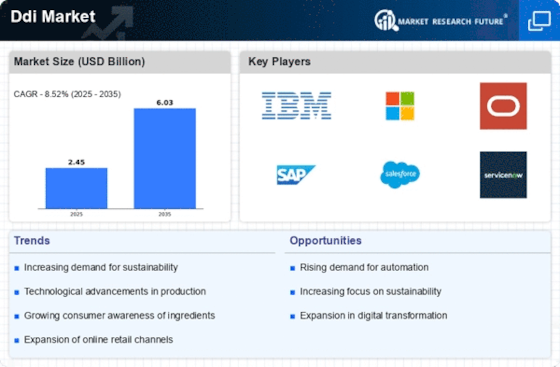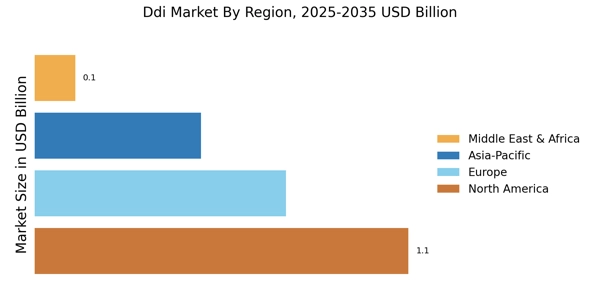Increased Focus on Data Security
In the Ddi Market, the emphasis on data security has intensified significantly. With the proliferation of cyber threats and data breaches, organizations are prioritizing the protection of sensitive information. This heightened focus is reflected in the growing investment in cybersecurity measures, which is expected to reach over 200 billion dollars by 2026. As businesses increasingly digitize their operations, the need for robust security protocols becomes paramount. This trend not only influences the purchasing decisions of companies but also shapes the offerings within the Ddi Market. Vendors that provide comprehensive security solutions are likely to see increased demand, as organizations seek to mitigate risks associated with data vulnerabilities.
Emergence of Remote Work Solutions
The Ddi Market is witnessing a significant shift towards remote work solutions, a trend that has been accelerated by changing workforce dynamics. As more organizations adopt flexible work arrangements, the demand for tools that facilitate remote collaboration and communication is on the rise. Recent statistics suggest that the remote work software market is expected to grow by over 20% annually in the coming years. This shift presents opportunities for companies within the Ddi Market to innovate and develop solutions tailored to remote work environments. By addressing the unique challenges of remote collaboration, businesses can enhance productivity and employee satisfaction, thereby solidifying their position in the market.
Regulatory Compliance and Standards
The Ddi Market is increasingly influenced by the need for regulatory compliance and adherence to industry standards. As governments and regulatory bodies implement stricter guidelines, organizations must ensure that their operations align with these requirements. This trend is particularly evident in sectors such as finance and healthcare, where compliance is critical. Companies are investing in solutions that facilitate compliance management, which is projected to grow at a rate of 12% annually. This focus on regulatory adherence not only impacts operational strategies but also shapes the product offerings within the Ddi Market. Vendors that provide compliance-focused solutions may find themselves in a favorable position, as organizations seek to mitigate risks associated with non-compliance.
Rising Demand for Digital Solutions
The Ddi Market is currently experiencing a notable surge in demand for digital solutions. This trend is driven by the increasing reliance on technology across various sectors, including healthcare, finance, and education. As organizations seek to enhance operational efficiency and customer engagement, the adoption of digital tools becomes imperative. Recent data indicates that the market for digital solutions is projected to grow at a compound annual growth rate of approximately 15% over the next five years. This growth is likely to be fueled by advancements in artificial intelligence and machine learning, which are becoming integral to the Ddi Market. Consequently, companies that can effectively leverage these technologies may gain a competitive edge, positioning themselves favorably in an evolving landscape.
Growing Importance of Customer Experience
In the Ddi Market, the significance of customer experience has become increasingly pronounced. Organizations are recognizing that delivering exceptional customer service is crucial for retaining clients and fostering loyalty. As a result, investments in customer experience technologies are on the rise, with projections indicating a market growth of approximately 10 billion dollars by 2025. Companies are leveraging data analytics and feedback mechanisms to gain insights into customer preferences and behaviors. This focus on customer-centric strategies is reshaping the offerings within the Ddi Market, as businesses strive to create personalized experiences that resonate with their target audiences. The ability to adapt to evolving customer expectations may prove to be a key differentiator in a competitive landscape.

















